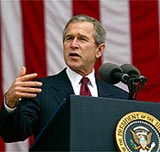 US President George W. Bush is known for having his own way with words. Last week he added to the growing list of "Bush-isms." US President George W. Bush is known for having his own way with words. Last week he added to the growing list of "Bush-isms."
Asked for his views on homosexuality during a White House news conference, Bush said it was "sinful." But, "mindful that we're all sinners," he added: "I caution those who may try to take the speck out of a neighbour's eye when they've got a log in their own." (Probable meaning: don't try to solve others' problems when yours are bigger.) This response was a classical Bush expression - unintelligible. Bush is a president who favours simple, to-the-point replies. When asked questions that require difficult answers, he often finds it hard to express himself. "He's a person who thinks words get in the way of communication," says Roderick Hart, a lecturer in communication studies at the University of Texas, Bush's home state. "He's a person who believes in direct, no-nonsense chatter." For instance, Bush said he wanted al-Qaeda terrorist leader Osama bin Laden "dead or alive" and pledged to "smoke him out" of Afghanistan's caves. "He goes for the crispest, simplest, probably least elegant language," says Hart. Other examples of Bush-isms are: "One of the great things about books is sometimes there are some fantastic pictures in them." "My administration has been calling upon all the leaders in the Middle East to do everything they can to stop the violence and tell the people involved that peace will never happen." "It's very important for folks to understand that when there's more trade, there's more commerce." "I think if you know what you believe it makes it a lot easier to answer questions. I can't answer your question." "We ought to make the pie higher."
"It's your money. You paid for it." "The vast majority of our imports come from outside the country." "If we don't succeed, we run the risk of failure." "I have made good judgments in the past. I have made good judgments in the future." "The future will be better tomorrow." "We're going to have the best educated American people in the world." (Agencies) | 眾所周知,美國總統喬治·W·布什有他獨特的駕馭語言的方式。上周,他又在日漸豐富的“布什語錄”中添了一筆。 在白宮的一次新聞發布會上,當被問及他如何看待同性戀時,布什說那是“不道德的”,但是他又補充說:“不要忘了我們每個人都有過錯,我要提醒那些只看見別人眼中有刺,而看不見自己眼中有梁木的人。” (布什的意思大概是:當你自己的問題很嚴重的時候就不要想著去解決別人的問題了。) 這個回答是典型的布什式語言--讓人覺得莫名其妙。布什總統喜歡簡單、直截了當的回答。當遇到難以回答的問題時,他往往很難把自己的意思表達清楚。 “他認為言語會妨礙交流。他相信直接而又嚴肅的談話。”得克薩斯大學傳播學講師羅德里克·阿特說。得克薩斯州是布什的家鄉。 例如,布什說他一定要抓住“基地” 組織的恐怖主義領導本·拉登,不管他“是死是活”,并發誓用煙將他從阿富汗的洞穴里熏出來。 “他喜歡用最干脆、最簡潔、但也可能是最不文雅的語言。”阿特說。 下面是布什語錄中的其他一些例子: “書的一大優點就是有時書里有一些稀奇古怪的圖片。” “我的政府已經號召中東所有的領導人盡他們的一切努力來阻止暴力事件的發生,并告訴有關人士和平是永遠都不可能實現的。” “很重要的一點就是要讓人們理解貿易越多的地方,商業就越多。” “我認為如果你知道你相信什么,那么回答這些問題就會簡單很多。我無法回答你的問題。” “我們應該把餡餅做得更高。” “這是你的錢,當然由你來支付。” “我們大量的進口商品是從國外來的。” “如果我們不成功的話,我們將冒失敗的風險。” “過去我已經做出了正確的判斷,將來我也已經做出了正確的判斷。” “明天和未來都會更好。” “我們將擁有世界上受教育最好的美國人。” No-nonsense: 實際的,嚴肅的 (中國日報網站譯) |
